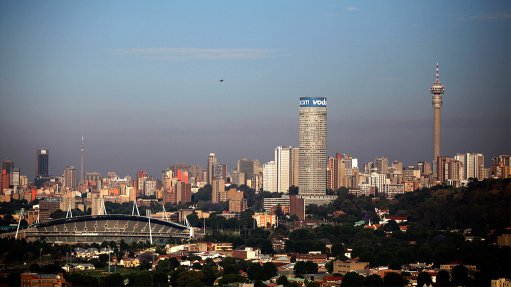Wins and trials at Olympics
There’s nothing like being at an Olympic event to really savour it – to measure it, to cherish it and to ‘feel it’. I was lucky enough to have tickets for the Stade de France track and field. ‘Feeling it’ is astounding. The seamlessness of the city, police and Olympic authority’s organisation saw us find and take our seats in the 80 000-seater Stade de France effortlessly – and at 10:00 sharp the games began. Nothing can prepare you for the speed, grace and perfection of the live event.
For me, it was personal, too. I came to honour what I laughingly call my Olympic gene: my great-great-uncle set a long-standing world record for the long jump and won two Olympic medals in 1906 – medals he refused to accept under the British colonial flag!
The Olympics – increasingly a legitimised channel for massive spending to refresh and upgrade mainly ‘old’ world cities – Beijing, London, Rio, Tokyo, Paris, Los Angeles – take country bidders a decade to plan and prepare. However, their main function is to showcase the world’s finest sports personalities, often making celebrities of them. It is their personal stories of the pursuit of excellence that is carried home and most felt in the Games’ long afterglow. Witness the huge celebration when Botswana’s Letsile Tebogo brought home the country’s first Olympic gold medal for the men’s 200 m race. Tebogo also led his team to a silver medal in the 4 x 400 m relay. Some 30 000 people filled the Gaborone stadium to welcome him home. President Mokgweetsi Masisi donned a dashing baby blue sports jacket, did a victory dance, and granted a half-day national holiday to celebrate the country’s first ever gold – perfectly capturing the national high as the country moves to elections in October.
The personal stories of these athletes are sometimes the most heart-wrenching: Tebogo’s running shoes were marked with the date of his mother’s birthday. Tragically, she died this May, months before her son brought home the gold. Similar heart-wrenching scenes were witnessed in Tiaret (Algeria) when a home crowd turned out to give gold medallist boxer Imane Khelif a heroine’s welcome – comfort after a bruising time amid controversy over Khelif’s gender.
Zambia’s team surprised many in qualifying for the men’s 4 × 400 m relay – arriving in Paris against all odds – with their coach worrying that ‘stage fright’ might affect their performance, as few of the team had competed in front of such a large crowd. Though the relay eluded them, Zambia’s Samukonga Muzala went on to bring back a bronze for the 400 m. Other also-rans that were in fact firsts include the South Sudan Bright Stars basketball team, which lost to the US by just one point! Thirteen years ago, South Sudan did not exist as a country and, until very recently, basketball was barely played on the continent – a sport growing in popularity in Africa, and one to watch out for in Los Angeles.
As in 2020 and 2016, Kenya topped the Africa medals table, winning 11 medals, including four golds, out of the 40 total medals for the continent. However, given the continent’s increasing wealth and youth, this medal tally is poor. South African banker and academic Colin Coleman commented on social media that “Africa with a GDP of $3.1-trillion, results were uneven. Kenya with four golds and 11 total medals outperformed, whilst Nigeria came away without a single medal.”
Just as Botswana’s gold medal gave the country a huge fillip, so Nigeria’s failure to bring a single medal home has resulted in much anger, frustration and soul searching. Most commentators put Nigeria’s poor performance down to corruption and chaos among Nigeria’s Sports Ministry, the Athletics Federation of Nigeria and the Nigerian Olympic Committee (NOC). The 100 m sprinter Favour Ofili – having trained for four years for the event – was left in tears after the Nigerian administrators failed to register her properly. It’s worth remembering that the AFN and the NOC failed to comply with Olympic testing rules ahead of the Tokyo Olympics, where 10 of Nigeria’s 23 athletes were automatically disqualified. Nigerian sports lovers were further humiliated that, despite nine-billion naira ($5.4-million) allocated to the Games, Nigerian cyclist Ese Ukpeseraye was put in the embarrassing position of having to borrow a bike from the German team to compete in an event. Media commentators reported a scandal with officials selling off tickets reserved for family members and supporters. Small wonder that several Nigerian sportsmen and sportswomen elect to compete under foreign flags where they can train and compete without these impediments. One of those disqualified ahead of Tokyo, Annette Echikunwoke, competed for the US in Paris 2024 and added a silver to the US tally for the women’s hammer throw.
With the huge feel-good factor that medal winners bring to their home nations, governments and businesses across the continent are missing a trick in accepting these low medal tallies. Not only do these sportspeople bring celebrity cache; they offer invaluable lessons to politicians and businesspeople alike in how to plan to achieve very specific goals through measurable and incremental improvements. According to 21-year-old Tebogo, his gold is four years ahead of schedule!
Some feel it is time for an African country to pitch to host the Games in 2040 but a far more achievable and less costly goal is to double and then treble the continental medal tally. The long-term sponsorship opportunities that Africa’s top sportsmen and sportswomen present for African businesses in Los Angeles and Brisbane abound. In the words of Zambia’s Samukonga Muzala, “This bronze medal represents the late nights and early mornings; the sweat, tears and sacrifices; the lessons learned and growth achieved.” But there’s no time to waste – only four years to go to Los Angeles!
Article Enquiry
Email Article
Save Article
Feedback
To advertise email advertising@creamermedia.co.za or click here
Press Office
Announcements
What's On
Subscribe to improve your user experience...
Option 1 (equivalent of R125 a month):
Receive a weekly copy of Creamer Media's Engineering News & Mining Weekly magazine
(print copy for those in South Africa and e-magazine for those outside of South Africa)
Receive daily email newsletters
Access to full search results
Access archive of magazine back copies
Access to Projects in Progress
Access to ONE Research Report of your choice in PDF format
Option 2 (equivalent of R375 a month):
All benefits from Option 1
PLUS
Access to Creamer Media's Research Channel Africa for ALL Research Reports, in PDF format, on various industrial and mining sectors
including Electricity; Water; Energy Transition; Hydrogen; Roads, Rail and Ports; Coal; Gold; Platinum; Battery Metals; etc.
Already a subscriber?
Forgotten your password?
Receive weekly copy of Creamer Media's Engineering News & Mining Weekly magazine (print copy for those in South Africa and e-magazine for those outside of South Africa)
➕
Recieve daily email newsletters
➕
Access to full search results
➕
Access archive of magazine back copies
➕
Access to Projects in Progress
➕
Access to ONE Research Report of your choice in PDF format
RESEARCH CHANNEL AFRICA
R4500 (equivalent of R375 a month)
SUBSCRIBEAll benefits from Option 1
➕
Access to Creamer Media's Research Channel Africa for ALL Research Reports on various industrial and mining sectors, in PDF format, including on:
Electricity
➕
Water
➕
Energy Transition
➕
Hydrogen
➕
Roads, Rail and Ports
➕
Coal
➕
Gold
➕
Platinum
➕
Battery Metals
➕
etc.
Receive all benefits from Option 1 or Option 2 delivered to numerous people at your company
➕
Multiple User names and Passwords for simultaneous log-ins
➕
Intranet integration access to all in your organisation

















